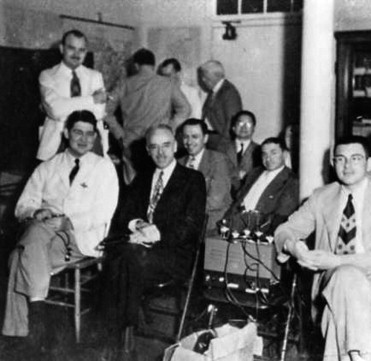Just 3 weeks before his 91st birthday, my father, J. Willis Hurst, died at Emory University Hospital on October 1, 2011. He had spent the last week of his life being cared for on the cardiology floor where for decades he had taught and inspired so many physicians. The numbers indeed are quite amazing, as it is estimated that over his 55-year career, he taught approximately 5,000 medical students and 2,500 residents and fellows combined.
During his hospitalization and after his memorial service, I have been overwhelmed by how many former trainees and colleagues have voiced expressions of sincere gratitude and appreciation for my father. One cardiologist told me, “He taught us all what it meant to be a real doctor.” Another said, “He was my role model and my tower of strength.” Another stated, “He made an indelible mark on me and was also like a father to me.” Another related, “Many times during my career, I felt your father’s presence as if he was looking over my shoulder.” I was also told, “He taught us that in this age of high technology, the most valuable test you could order when evaluating a patient was taking a good history.” Hearing these statements and similar expressions repeatedly, emphasized to me that my father’s greatest legacy was not so much his famous textbooks or the numerous scientific articles he authored but the profound influence he had on so many lives that he had touched over the course of his long career.
My father was, first of all, a devoted and loving husband to my mother. They became sweethearts in college and were married in his second year of medical school. They had a wonderful and fulfilling marriage that spanned 61 years. He would constantly acknowledge her support and contribution to his many accomplishments by adding to the prefaces of his many books, “No Nelie, no book.”
My father loved and enjoyed his family and worked relentlessly to ensure that we had family time despite the demands of his career. As a family, we went on many trips together, as he was invited to so many places as a visiting professor. We spent a month in Mexico and 3 weeks touring the West and made several trips to Hawaii. In 1993, we accompanied him on a tour of Japan. However, my most memorable trip was an overnight stay in the White House. There I was able to watch him interact with his most notable patient and good friend, President Lyndon Johnson.
In the mid-1970s, during my internal medicine training at Parkland Hospital, I decided with some trepidation that I wanted to launch a career in cardiology. After much deliberation, I sought a fellowship at Emory, which I felt had one of the finest clinical programs in the country. I felt quite fortunate that my father gave me such an opportunity.
I have many great memories of my Emory cardiology fellowship and am thankful for having had the opportunity to work with so many excellent clinicians. My most vivid memories of my father at that time were the cardiology conferences he conducted, which allowed him to showcase his skills as a master clinician. These would involve a patient presentation followed by a detailed cardiovascular examination and an almost magical interpretation of the electrocardiogram. He then would lead a discussion of the patient’s problem, emphasizing to us the importance of critical thinking and the value of good clinical judgment. He made learning cardiology a joy!
During his career, he taught the importance of clinical excellence but also emphasized the humanistic aspects of medicine. His views are well summarized by a quotation of his that was engraved on a plaque in 2004 to commemorate the naming of Emory’s internal residency program as the J. Willis Hurst Internal Medicine Residency Program. The quotation is as follows:
“You may wonder why patients never ask you about your academic standing in medical school or if you belong to an honor society. In fact, patients rarely ask which medical school you graduated from or where you worked as a house officer. Patients don’t seem to worry about those things; they judge you quite another way. They understand if you are kind and thoughtful to them and their families. They can sense if you care about them, and that is how they judge you. They assume you know what you are doing. This leads to the concept that integrity is the basis of good doctoring because you and you alone know if you really know what you are doing. “Consideration of the foregoing will lead you to realize that the practice of medicine is predominantly a humanistic act. Physicians must care about their patients, and must constantly improve their scientific knowledge about disease. To care and not know is dangerous. To know and not care is even worse. Caring and knowing must be combined to succeed in doctoring.”
I believe the profession will miss him greatly ( Figures 1-9 ).





